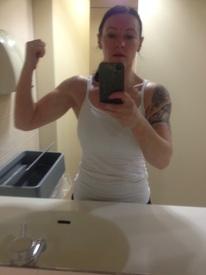Maybe reducing sodium isn't the best choice for everyone...

UpEarly
Posts: 2,555 Member
Interesting research:
http://www.cnn.com/2011/HEALTH/05/03/salt.heart.attack/index.html?hpt=Sbin
"The researchers don't have a firm explanation for this finding, but they speculate that sodium intake low enough to decrease blood pressure may also decrease sensitivity to insulin, encourage a stress response in the nervous system, and affect hormones that regulate blood pressure and sodium absorption. "Each of these effects might have unfavorable impact on cardiovascular mortality," Staessen says."
http://www.cnn.com/2011/HEALTH/05/03/salt.heart.attack/index.html?hpt=Sbin
"The researchers don't have a firm explanation for this finding, but they speculate that sodium intake low enough to decrease blood pressure may also decrease sensitivity to insulin, encourage a stress response in the nervous system, and affect hormones that regulate blood pressure and sodium absorption. "Each of these effects might have unfavorable impact on cardiovascular mortality," Staessen says."
0
Replies
-
I saw this article. I do however think reducing sodium still helps with the water retention so many of us deal with!0
-
bump0
-
AgreeI saw this article. I do however think reducing sodium still helps with the water retention so many of us deal with!0 -
Yep, I do it for the water retention! If I eat salty foods, it basically erases any progress for me on the scale for a few days. I'd rather avoid it and have the scale cooperate.0
-
That's ok, a lot of people drink TONS of water - but I can't because of my disease my body will retain water like no other. I constantly can feel bloated if I drink the normal 8-12 cups everyone else drinks.
Different people, different experiences 0
0 -
Always get at least 500mg of sodium per day. People who exercise (i.e. sweat) a lot need more sodium. 1500mg max is for people who already have HBP or are 'salt-sensitive'. The body can process up to 30,000mg of sodium daily (can't remember where I read this).
I don't worry about water weight anymore. It disappears just as fast as it happens. The body fat is what I worry about. The number on the scale is just a number.0 -
I don't think anyone is advocating to cut sodium out all together. Just that it's not healthy to eat 3,000 - 5,000 mg of sodium a day. It's all about moderation. Plus there are some serious flaws to this study that raise a lot of questions.0
-
I think it is the Mayo Clinic that recommends 1500mg of sodium if you are over 51 yrs of age.
A low sodium diet is considered a 2GM sodium count for the day.
I think you just have to use good sense and if you are not eating a ton of processed and packaged foods (use in moderation) you are ok.0 -
I think it is a true a bit, i do not put any salt on my foods and probably have a low sodium diet, a little while back I was feeling very dizzy and lightheaded and strange, had quite low blood pressure, and my dr told me to add more salt, I did that, and it got back to normal again! Although now, I have gone back to the low salt way of eating.0
-
My cardiologist is always telling me to eat more salt AND drink more water. I have low blood pressure though. I think it really depends on the person and their health conditions.0
-
I think it is the Mayo Clinic that recommends 1500mg of sodium if you are over 51 yrs of age.
A low sodium diet is considered a 2GM sodium count for the day.
I think you just have to use good sense and if you are not eating a ton of processed and packaged foods (use in moderation) you are ok.
This is kind of the philosophy I personally follow. Most days, I end up with about 2000mg of sodium. It's not hard to do, because I don't eat a lot of processed foods. However, on the weekends when I do ultra-long workouts or go backpacking, I tend to sweat a lot and eat a lot, and usually go over 2500mg of sodium.0
This discussion has been closed.
Categories
- All Categories
- 1.4M Health, Wellness and Goals
- 398.2K Introduce Yourself
- 44.7K Getting Started
- 261K Health and Weight Loss
- 176.4K Food and Nutrition
- 47.7K Recipes
- 233K Fitness and Exercise
- 462 Sleep, Mindfulness and Overall Wellness
- 6.5K Goal: Maintaining Weight
- 8.7K Goal: Gaining Weight and Body Building
- 153.5K Motivation and Support
- 8.4K Challenges
- 1.4K Debate Club
- 96.5K Chit-Chat
- 2.6K Fun and Games
- 4.8K MyFitnessPal Information
- 12 News and Announcements
- 21 MyFitnessPal Academy
- 1.6K Feature Suggestions and Ideas
- 3.2K MyFitnessPal Tech Support Questions









